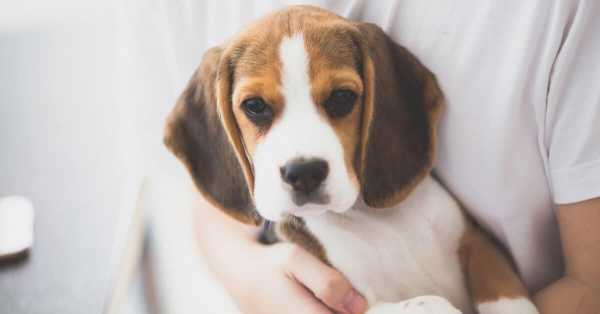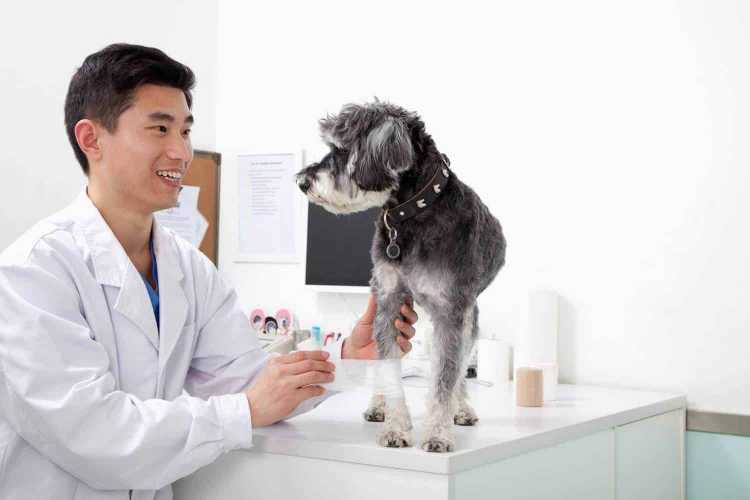Puppies are usually voracious eaters, so seeing our little bundles of fun turn their back on food can be extremely distressing.
If your pup won’t eat, and is displaying other signs of distress, there may be some underlying condition that requires prompt veterinary assistance.

But if they’re otherwise happy, healthy, and as full of life, as usual, it can be hard to understand the sudden change. Let’s look at some of the reasons for your puppy’s lost appetite, and what you can do to get it back.
How Do I Know If My Puppy Is Eating Enough?
If your puppy is lively, healthy, and active, they are probably getting enough to eat.
If you’ve any concerns, monitor your pup’s weight on a daily basis, and make sure their weight follows an upwards trend.
If your puppy is losing weight, displaying signs of lethargy, pain, or distress, or you notice a sudden, unexplained change in their previously healthy appetite, further action may be required.
Read To Know: Why Does Your Great Dane Eat Grass?
Why Is My Puppy Refusing to Eat?
A temporary loss of appetite is often nothing to worry about. More often than not, your pup will be back to normal in a couple of days.
However, it can sometimes be a sign of something more serious. Your puppy may have an upset tummy, be in pain from an injury, have a virus, parasite infestation, or some other illness.
It could even be that they’re feeling a little anxious or stressed. Sometimes, the reason is as simple as them being unhappy with the choice of food on offer (pups can be as picky as toddlers when it comes to mealtimes).
Read on to find out more about why your puppy might not be eating.
Behavioral Reasons
If your pup is constantly barking, tearing up the furniture, pulling on the leach, or being flagrantly disobedient, their loss of appetite may be a symptom of a broader behavioral problem.
However, even if your dog has other behavioral issues, a refusal to eat may be down to an entirely separate issue (including a potential medical problem), so always rule out other possibilities in the first instance.
Read To Know: Why Does Your Boston Terrier Cry Like A Baby?
#1 Food Quality
Most dogs will gobble down just about anything.
However, if your pup is the more discerning type, they may refuse foods that don’t meet their high expectations.
If you have a little gourmet on your hands, avoid giving them cheap foods that skimp on quality; the low protein content and smorgasbord of artificial additives and preservatives is unlikely to appeal to their superior taste-buds.

#2 Unhappy with Food Choice
Sometimes, your pet’s refusal to eat can be a sign they don’t like the food on offer.
If you’ve recently changed their diet, your pup may voice their disapproval by simply refusing to eat.
Try switching back to their old food for a few days to see if it helps.
#3 Pickiness
If you’ve ever seen a toddler pick their way around a plate, you’ll know how particular we humans can be when it comes to food.
But fussy eating isn’t limited to people; dogs can be picky, too.
If you find your pup is refusing their food, it could be they don’t like its flavor, or a certain ingredient is making their stomach turn.
Dogs can be particularly sensitive to certain vegetables or sour tasting foods. Try switching things up with a change of food to see how they react.
Read To Know: Why Does Your Husky Bury Things?
#4 Stress
Believe it or not, pups are just as susceptible to stress as humans.
If you’ve recently moved to a new house, introduced a new family member or pet into the home, or have had to leave your pup for any extended periods, they may be feeling too anxious to eat.
Keep an eye open for anything that may be stressing your pup, and take steps to minimize the impact as much as possible.
Take some inspiration from the top tips available in this video.
#5 Too Many Treats
If you’re treating your pup to yummy snacks throughout the day, it’s little wonder they’re refusing to eat their plain old kibble come dinnertime.
If you asked your child would she rather eat spinach or a Twinkie, the answer is obvious,” says Louise Murray, DVM, ACVIM, and director of medicine for ASPCA’s Bergh Memorial Animal Hospital.
If you’re going to sometimes give your dog bacon for breakfast or steak from your plate, why would you blame him if he shies away from dry dog food?”.
Try following the advice of The American Society for the Prevention of Cruelty to Animals and limit treats to no more than 5% of your dog’s daily calorie intake.
Popular Reading: How Do I Challenge My Dog’s Mind?
#6 Travel and Unfamiliar Surroundings
Dogs are creatures of habit, and a sudden change in the environment can trigger anxiety.
If you’ve recently moved, or have taken your dog on vacation, they may be too uneasy in their new surrounds to eat.
Similarly, if you’ve only recently welcomed your new pup into your home, it may take some time for them to adjust.
Check out the video on how to make your pup feel more at home.
Read: What If My Dog Lick My Face?

Medical Issues
Generally, a pup’s refusal to eat is nothing to be too concerned about.
However, it can occasionally be a sign that they are experiencing a serious health issue.
If left untreated, diseases such as cancer, organ disease, and toxic infections can result in long term appetite loss.
If your pet is showing symptoms such as lethargy, depression, significant weight loss, or signs of pain or discomfort, get them checked over by a vet as soon as possible.
#1 Age
If your once ravenous dog has started to turn their back on food, it could just be down to the aging process.
As dogs get older, they can start to lose their sense of smell and taste.
They may also experience dental problems that make it uncomfortable to eat harder foods.
Switching to a soft, easy-treat formula with plenty of rich, strong flavors is often enough to win back their appetite.

#2 Dental Disease
Check your pup’s mouth to see if their gums look swollen or inflamed.
If they are, it could be a sign of gingivitis or periodontal disease.
Sore gums or painful teeth can make chewing and eating extremely painful, and your pup may prefer to go hungry than risk the pain of eating.
If you suspect dental issues are at the root of your pup’s loss of appetite, get them checked out by a vet as soon as possible.
Until then, take our advice and restrict their diet to soft, wet foods.
#3 Upset Stomach
Puppies are notorious for gobbling up … well, pretty much anything.
If your dog’s been snacking at the trash can, they could be paying the cost with a mild tummy upset.
Usually, the effects are mild, but they may have a few days of abdominal discomfit, with some sickness and diarrhea into the bargain.
The symptoms will pass soon enough, but your pup is likely to avoid food until they do.
#4 Digestive Infections
Your puppies’ gut can be a breeding ground for viruses like Parvo, bacteria, intestinal worms, and other parasites.
Many pups are born with “roundworms”, which, along with toilet problems, can cause weight loss and appetite reduction.
They may also have picked up some other parasites along the way, including tapeworms, hookworms, whipworms, or heartworms.
If a parasitic infection is at the route of your pup’s food issues, speak to your vet about the best de-worming program.
#5 Organ Disease
You may think your pup is too young to be suffering from organ disease, but some conditions like liver, heart, or kidney disease can be present from birth.
Diseases may also occur through infection or injury.
Organ disease can be very serious if not probably treated: if your pup shows any sign of pain or illness in conjunction with their appetite loss, get them checked by a vet as soon as possible.
#6 Pain
Just as we can lose our appetite if we’re in pain, so too can our pets. Perhaps they’ve suffered an injury, or have a splinter lodged in their mouths.
If your pup is young, they may be experiencing teething or growing pains.
The pain could be the result of a minor condition, like impacted anal glands, but equally, it could indicate a more serious medical issue.
If you’ve ruled out any obvious external reason for your pet’s discomfort, it’s time to get them to the vet.

#7 Recent Vaccinations
While vaccinations have saved the lives of millions of pets, they’re not without their side effects.
If your pet has recently had a round of jabs, it could very well explain their sudden loss of appetite
Fortunately, the side effects of vaccinations are usually mild and temporary, and your pup should be back to their normal happy self within a few days.
#8 Respiratory Infection
Although rare, your dog’s refusal to eat may be a symptom of respiratory disease.
Fluid in or around the lungs, canine influenza, asthma, and bronchitis are serious illnesses that require prompt medical attention.
If your dog shows signs of respiratory distress (e.g. difficulties breathing or rapid breathing), get them to a vet as soon as possible.
Read: Why Do Anatolian Shepherds Bark So Much?
How Can I Tempt My Puppy To Eat?
Don’t despair if your otherwise healthy puppy is reluctant to finish their food.
A few simple techniques can work wonders in restoring their appetite.
Turn mealtimes into a game: introducing a fun, food-dispensing toy such as Our Pets IQ Treat Ball can help motivate even the pickiest of eaters.
Up the “Yum” factor: make food irresistible with the help of a flavored spray.
Green Seal Products Flavored Omega 3 Dog Spray comes with the added advantage of healthy Omega 3 fatty acids.
FAQ’s About Puppy Not Eating
# My Puppy Isn’t Eating But is Acting Normally. Should I be Worried?
If your puppy isn’t eating but is displaying no other signs of illness or distress, it could simply be that you’ve been feeding them too much.
If you’re treating them to snacks throughout the day and then overloading their feeding bowl at mealtimes, your pup may be feeling too stuffed to eat.
Occasionally, dogs will simply lose their appetite for a short time for no real reason.
Providing it doesn’t last more than a couple of days, and they are otherwise healthy and happy, there’s usually no cause for concern.
# Why is My Puppy Drinking a Lot of Water But Not Eating?
If your pup is drinking but not eating, they may have an upset tummy.
Pups quite often eat things they shouldn’t, resulting in gastric distress or discomfort.
Usually, the effects are temporary, and your pup will be back to normal in a couple of days.
If they develop any other symptoms, or if their appetite doesn’t return, contact your vet.

# How Long Can a Picky Puppy Go Without Eating?
Dogs can sometimes go several days without food, but if your pup is very young, you need to be vigilant.
Young puppies have less fat and fluid reserves than older dogs, so shouldn’t go completely without food for more than 12 hours.
If your puppy is refusing food completely, seek medical attention.
# Is It Normal for Puppies to Lose Their Appetite?
All dogs can occasionally lose their appetite.
As long as your puppy isn’t showing any other symptoms of illness, there’s probably no cause for concern.
Monitor them closely and if their appetite still hasn’t picked up within 2 days, or if they start refusing food completely, have them checked out by a vet.
# Will My Puppy Get Bored With the Same Food Every Day?
Although we may balk at the idea, dogs will be quite content to eat the same meal each day for their entire lives.
Dogs are still opportunistic hunters at heart, so are used to eating whatever they can find, whenever they can find it.
# Will My Picky Puppy Starve?
If your otherwise healthy pup is just a picky eater, there’s very little chance they’ll let themselves starve.
If they’re refusing their food in the hope of something better, they may try to hold out for as long as possible (dogs are nothing if not devious), but if there’s food available, they will eventually eat it, no matter how fussy they are.
# Does My Puppy Have Anorexia?
A refusal to eat in dogs is referred to as anorexia. In humans, anorexia refers to an eating disorder; in dogs, it describes a complete loss of appetite.
If your dog is refusing food completely (including treats), then it is classed as having anorexia.
# What Should I Do If My Puppy has Anorexia?
Anorexia in puppies can be an indication of illness or disease, especially if it’s accompanied by a fever.
If your pet hasn’t eaten for 12 hours or more, or shows other signs of illness, have them checked over by a vet.
If your vet rules out any medical problem, try some techniques to stimulate your pup’s appetite.
Take a look at the video for some inspirational tips.
# Should I Feed My Puppy What My Breeder Recommends?
Yes. Most breeders will recommend complete puppy food that complies with veterinary advice.
It’s also a good idea to feed your new pup the food they’re used to, at least in the first few weeks or so.
Puppies can react badly to sudden changes in diet, or refuse the change altogether, so it’s best to keep them on familiar foods at first, and only introduce changes over a gradual period.

# If My Puppy Isn’t Eating, When Should I Take them to the Vet?
Although dogs can skip meals for a couple of days without any serious consequences, it’s best to address the problem sooner rather than later.
This is especially true in the case of very young puppies, where even one missed meal can be a problem.
If your puppy is very young or is displaying any other symptoms, seek help after 12 hours of food refusal, or earlier if they show signs of pain or illness.
Share Your Thoughts
I do hope you’ve found the information in today’s post useful. If you feel the advice could benefit other pet owners, feel free to share the link.
As a dog owner myself, I’m always interested in hearing about new ways of keeping our four-legged friends in tip-top condition.
If you have any of your own experiences or stories to share, I’d love to hear them in the comment section below.
Further Readings
- https://www.walkervillevet.com.au/blog/feeding-new-puppy-faqs/
- https://www.aspca.org/pet-care/dog-care/dog-nutrition-tips
Related Topics:
1. Why My Dog Won’t Eat Her Food, But She’ll Beg For Ours?
2. 20 Super Tips: How To Calm Your Hyperactive Dog?
3. Can Pit Bulls Jump Over Fences?
4. What To Do When Your House Smells Like Dog Urine?
5. Why Do Border Terriers Howl?
6. Why Does Your Border Collie Howl?

